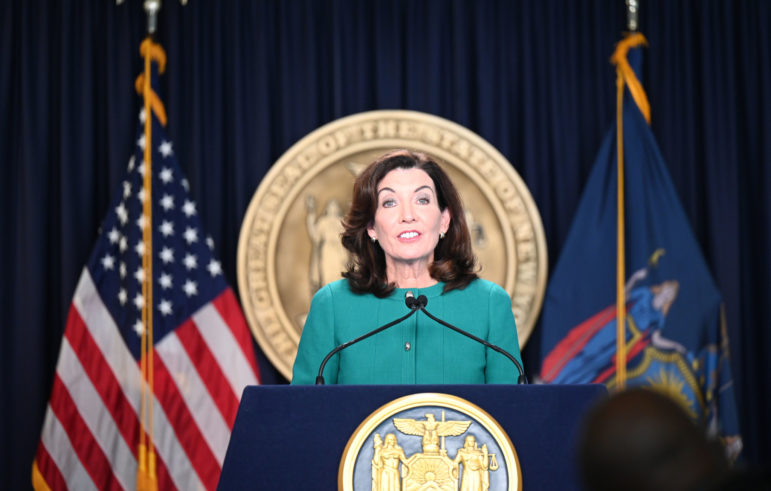The governor nominated Daniel Tietz to lead the state agency tasked with overseeing New York’s tapped-out rent relief fund and administering key social service programs amid an historic homelessness crisis.

Kevin P. Coughlin/Office of the Governor
Gov. Kathy Hochul during a media briefing this week.Gov. Kathy Hochul on Wednesday nominated longtime homeless services administrator Daniel Tietz to lead the state agency tasked with overseeing New York’s tapped-out rent relief fund and administering key social service programs amid an historic homelessness crisis.
Tietz, a policy expert, nonprofit head and former top official in New York City’s Department of Social Services under Mayor Bill de Blasio, would become commissioner of the state’s Office of Temporary and Disability Assistance (OTDA). He has most recently served as a fixer for two of the city’s problem-plagued service organizations.
In February, he took control of the Bronx Parent Housing Network following the arrest of the group’s CEO on corruption charges and a New York Times investigation that revealed allegations of sexual assault and coercion against residents of the group’s women’s shelters. A year earlier, a state judge appointed Tietz to steer scandal-scarred shelter provider Childrens’ Community Services after its administrators were accused of defrauding the city through a network of phony subcontractors.
Tietz’s nomination as OTDA commissioner was confirmed by Hochul’s office ahead of a formal announcement Wednesday. Tietz did not respond to multiple calls, emails and direct messages, but he describes his leadership perspective in his exhaustive LinkedIn profile.
“With me are high-performing teams and diverse constituencies whom I rally around shared goals,” Tietz wrote.
Several advocates and policy experts who spoke with City Limits ahead of Hochul’s announcement described Tietz as an effective administrator who isn’t afraid to clean house—even if that means making some enemies.
“He doesn’t suffer fools,” said one veteran advocate who has worked with Tietz and asked to remain anonymous. Another called him “abrasive” but “competent and committed to” low-income New Yorkers.
If confirmed as commissioner, Tietz would take over OTDA’s vacant leadership position. Former agency head Michael Hein resigned in October following a creaky rollout of the state’s $2.4 billion Emergency Rental Assistance Program (ERAP) and the departure of his boss, Gov. Andrew Cuomo.
Tietz would oversee ERAP at an especially challenging moment: The state’s eviction protections will expire on Jan. 15, but OTDA has allocated or earmarked nearly all of its rental assistance funds. Hochul and OTDA decided to shut down the application portal last month and now face a lawsuit filed by the Legal Aid Society demanding that the state resume accepting applications.
Hochul is seeking about $1 billion in additional funds to cover unpaid landlords, and the state could soon redistribute $250 million of the existing fund that has yet to be claimed or sent to landlords.
OTDA also administers crucial benefit and entitlement programs for low-income New Yorkers, including Supplemental Nutrition Assistance Program, also known as food stamps; the Home Energy Assistance Program (HEAP); and Supplemental Security Income (SSI) and Social Security Disability (SSD). In addition, the agency funds the state’s recently increased FHEPS rental assistance program for families on public assistance who are homeless or at risk of becoming homeless.
Even before the COVID crisis, New York faced a massive homelessness crisis. In January 2020, the federal government estimated that more than 91,000 people were homeless across the state. Advocates and lawmakers fear the number of homeless families and individuals will only surge as pandemic-related eviction protections expire.
In New York City, about 46,000 people stayed in a Department of Homeless Services (DHS) shelter on Monday, according to the city’s most recent daily census. Thousands more bed down in public spaces or stay in beds reserved for street homeless New Yorkers, city-funded domestic violence shelters and temporary youth residences. An untold number of others double up with family, friends or other associates in apartments where their names do not appear on a lease.
Tietz is familiar with the problems that lead to homelessness in the city and state: He has worked in New York City social services for three decades, specializing in homeless policy, LGBTQ rights and HIV/AIDS support services.
In his LinkedIn profile, Tietz said he “oversaw DHS intake and shelter operations serving 59,000 adults and children” as deputy to Commissioner Steve Banks from 2014 to 2017—the period of the city’s record-high shelter population. During that stretch, the city merged the Human Resources Administration and DHS under the same DSS umbrella and implemented or expanded several initiatives to prevent low-income New Yorkers from becoming homeless. At the same time, the city struggled to connect its existing homeless population with affordable homes.
Tietz is a board member at HousingWorks and spent a year as CEO of Bailey House, which runs residential and support programs for people with HIV/AIDS.
HousingWorks President and CEO Charles King said Tietz’s nomination could be good news for New York City after years of state government shifting homeless service costs to its largest municipality (the state once covered 50 percent of New York City’s shelter costs; Albany now covers 9 percent). Tietz could advocate for the city’s social service needs during budget negotiations, King said.
“Dan has a deep understanding of decisions that OTDA should and could make, as well as changes OTDA should be pressing on the federal level, like improving access to housing vouchers, improving access to public assistance, allowing people who are beneficiaries to work and be gainfully employed without being cut off,” King said. “He is very sympathetic to the issues facing the city because he sat on the city side of the struggle.”
Banks—Tietz’s former boss and a frequent critic of the state’s divestment from New York City homeless services—also praised the nomination.
Tietz, he said, “is an extraordinary advocate, a highly effective not-for-profit manager, and a great partner in our reforms when he was a senior leader at the Department of Social Services.”









